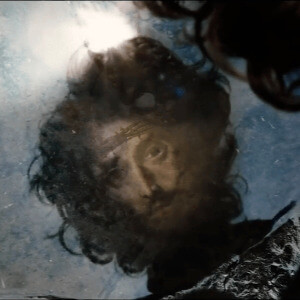The horrors of the latest news cycle, indicating Pope Francis covered up sexual abuse reports to allow former Archbishop McCarrick to continue in his post, hold such vast and far-reaching implications that commentary on a movie from a few years ago feels trite and perhaps escapist. Nonetheless, the Vatican’s response to Vigano’s letter, “I will not say one word on this. I think the statement speaks for itself” invites further reflection upon Martin Scorsese’s 2016 film Silence.
Whose Glory?
At the film’s opening, Jesuit priests Rodrigues and Garupe receive a report from Valignano that Ferreira, their famed mentor and missionary to the Japanese, has apostatized. Rodrigues passionately protests: “If it is true, Father, what would it mean for the Society? For our faith? For all of Catholic Europe? Father, it seems our mission here is more urgent than ever. We must find Father Ferreira.” Later, after Rodrigues is captured by the Japanese, he is not merely tortured so that he would also apostatize; Rodrigues is forced to endure watching Japanese Catholics being tortured and martyred in a crushing persecution that would continue until Rodrigues renounced his faith, as the Grand Inquisitor Inoue mocked, “The price for your glory is their suffering!” Ultimately, Rodrigues believes he hears the voice of Jesus calling him to trample the fumie; Rodrigues, like Ferreira, renounces his faith publicly and repeatedly for the rest of his life, and in so doing, Rodrigues saves the lives of, and secures the survival of, the remaining persecuted Catholics in Japan.
 “Our Lord,” as the apostate priests Ferreira and Rodrigues continued to refer to Jesus, warned against the rocky soil whose seed withers upon persecution (Matt 13:21). The ascended, living, speaking Christ exhorted the persecuted and imprisoned church at Smyrna to “be faithful unto death and I will give you the crown of life” (Rev 2:10). But whereas Rodrigues at the film’s opening saw Ferreira’s apostasy as a crisis for the Western church’s power, prestige, and reputation, Rodrigues in the end values the well-being and lives of his Catholic flock in Japan over the “glory” of his own martyrdom. Rodrigues’ apostasy contrasts starkly with that of Kichijiro, who repeatedly apostatizes with tremendous guilt to avoid his own suffering; Rodrigues’ apostasy is also set against the foil of Garupe’s martyrdom, who drowns while desperately trying to save his flock. Rodrigues’ apostasy is a repudiation of his own idolatry in order to follow the trampled, crucified, living, speaking Christ who cares for his lambs (2 Cor 13:3-4). He shares in the apostle Paul’s anguish for his Jewish brethren, wishing to be “accursed and cut off from Christ” that they might be saved (Rom 9:3).
“Our Lord,” as the apostate priests Ferreira and Rodrigues continued to refer to Jesus, warned against the rocky soil whose seed withers upon persecution (Matt 13:21). The ascended, living, speaking Christ exhorted the persecuted and imprisoned church at Smyrna to “be faithful unto death and I will give you the crown of life” (Rev 2:10). But whereas Rodrigues at the film’s opening saw Ferreira’s apostasy as a crisis for the Western church’s power, prestige, and reputation, Rodrigues in the end values the well-being and lives of his Catholic flock in Japan over the “glory” of his own martyrdom. Rodrigues’ apostasy contrasts starkly with that of Kichijiro, who repeatedly apostatizes with tremendous guilt to avoid his own suffering; Rodrigues’ apostasy is also set against the foil of Garupe’s martyrdom, who drowns while desperately trying to save his flock. Rodrigues’ apostasy is a repudiation of his own idolatry in order to follow the trampled, crucified, living, speaking Christ who cares for his lambs (2 Cor 13:3-4). He shares in the apostle Paul’s anguish for his Jewish brethren, wishing to be “accursed and cut off from Christ” that they might be saved (Rom 9:3).
The Crisis and the Cross
North American Christianity, Protestant and Roman Catholic, is in an age of crisis. The enemy is not a persecutor without, but rampant abuse from within, as the #churchtoo movement indisputably and overwhelmingly attests. It is again time to apostatize from our delusions of grandeur. Amidst seemingly endless occurrences of abuse and cover-ups, both driven by obsessions with power at the expense of the weak and the vulnerable, it is time to renounce the demonic gods to whom abuse victims are slaughtered as living sacrifices. It is time for unfettered accountability, for judgment to begin with the household of God. It is time for the corruption that festers when concealed in darkness to be brought into the holy, searing light of accountability that alone can create measures to prevent further abuse and perhaps, though not certainly, provide some sense of justice or prevention for our victims. It is time, but not because of the “progress” of some Geist; it is time because the crucified Messiah from Nazareth is risen from the grave and presently addressing his Bride by the Spirit.
Silence famously and frustratingly ends in tremendous ambiguity regarding whether or not Rodrigues himself was “lost to God… as to that, only God can answer.” Amidst the widespread abuses plaguing North American churches, the corruption of cover-ups, and the dangerous political idolatry and opportunism of evangelicals like Robert Jeffress and Eric Metaxas, the same question haunts our landscape. Not like Rodrigues, but like Rodrigues, it is time for the church to resume or begin following the crucified and risen Messiah from Nazareth — who loves the vulnerable, the weak, and the marginalized — in the way of the cross, regardless of what it means for the Society, for our faith, for all of Christendom; it seems our mission here is more urgent than ever.





